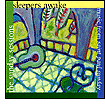Saint Paul Sunday presents
Sleepers Awake
A Winning Portrait of the Series
September 18, 1998
by Vaughn Ormseth
| Enjoy these selections from the CD in RealAudio 3.0 28.8 (See How to Listen.) Bach: Brandenburg Concerto no. 3; Los Angeles Guitar Quartet Beethoven: Sonata in A Op. 12, No. 2; Pamela and Claude Frank Delibes: Flower Duet; Christopher O'Riley, piano |
|
| Contents | Ordering Information | |

"SO YOU'RE SHIPWRECKED on this desert island," the familiar dinner party premise is posed. "What books do you have to have? What people? What works of music?"
It's a romantic question, and a toughie - not one most of us take too seriously in the light of day. But ask Saint Paul Sunday senior producer Mary Lee about the selection process behind Sleepers Awake, the series' recently released compact disc, and you get the idea that such scenarios do have their real-life equivalents. Working with the Saint Paul Sunday team, Lee had to choose 14 works from Saint Paul Sunday's nearly 20 seasons of performances.
What's it like to whittle such a vast archive down to just a handful of works?
"Very exciting," says Lee. "I can remember going home one night right after we began first talking about a CD. I took a pad of paper and a lawn chair outside and just started listing by category. But there was so much - composers, performers, early music, Romantic, Baroque. When we really got down to it Sleepers Awake turned out to be about poetry and virtually nothing about lists. We've got Bach next to Lakmé! Bill [McGlaughlin] has called it a kind of essay. I think of it as a collage or mosaic."
Indeed, perhaps the most consistent quality among the diverse works on Sleepers Awake - which takes its title from the CD's final cut, a beguiling performance of J.S. Bach's transcribed chorale prelude Wachet auf by pianist Awadagin Pratt - is an emotional charisma.
"When I listen to this music," says host Bill McGlaughlin, "I really have a very personal response. It's as though I can see the musicians. Most of them are used to giving major concerts - playing to the back row of big halls. When they get into the studio, something very different happens. I'm convinced that the best performing anyone does is at home around friends and family, and I've often seen my role at Saint Paul Sunday as a sit-in for the folks at home."
This human connection, long a beloved signature of the series, survived the CD mastering process as well. Many digital recordings are polished to an almost clinical perfection these days - a quality for which they're increasingly criticized - and the arduous recording process itself can have a chilling effect on artists' playing. But since each of the performances on Sleepers Awake originated in sessions where live music-making and intimate conversation were prized over pristine takes, the warmth and spontaneity of the originals come through intact.
"There was a period in very early recording where performance was everything," says Saint Paul Sunday music producer Steve Barnett, whose ear and expertise have helped guide the CD through its mastering process. (Barnett was also the music producer present at many of the original sessions.) "You played a work from top to bottom. That was the ideal. Then tape came along with the ability to edit, and another kind of perfection became possible, but at some real sacrifice to the excitement of live performance. The performers on Sleepers Awake are playing for an audience- Bill, who represents many others - which is a real advantage. He inspires them."
Getting artists' permission to preserve onto disc what were performances initially meant for radio was no mean feat, says Lee. At the same time, it wasn't as challenging as it could have been. "The artists have been overwhelmingly responsive to this project," she says, "which I think reflects their experiences on Saint Paul Sunday. Most of them are good friends of the show and really open up when they get here. They have wonderful memories, which has helped a lot."
That familial ease has not only given Sleepers Awake breathtaking music, but also performances available nowhere else. Garrick Ohlsson, whose name has become nearly synonymous with Chopin, the composer he has recorded exhaustively to great acclaim, performs a radiant Handel fugue. Carter Brey, principal cellist of the New York Philharmonic, offers up Fritz Kreisler along with Bach. And Claude and Pamela Frank - pianist and violinist as well as father and daughter - reveal the soul of Beethoven in one of his sonatas.
Each of the selections recovers some quality of the unique musical event it was. And if performance radio is a largely ephemeral medium, CDs stick around. "After so many years of radio," Lee admits a little wistfully, "it has felt good to work on something so tangible."
Sleepers Awake takes full advantage of that durability. McGlaughlin's liner notes offer sharp observations in the form of brief stories on each selection. Ellen Simonson, the local Saint Paul artist whose vividly colorful work graced Saint Paul Sunday's first CD, American Air, renders the Sleepers Awake cover in sunnier hues - a green-golden hillside viewed through lavender arches of a terrace. Lee's eyes and ears contributed to the process; she and Simonson worked through a number or portraits before arriving at the one above. "There's a real integrity to the package," Lee continues, "beginning with the performances and how they came together, the notes, the art. It's all part of a whole."
At the heart of Sleepers Awake, there's great music. "It's always been a particular kind of pleasure to go back through our archives," says McGlaughlin," though I don't do it very often. When I do, it's usually with a purpose, like dipping into old photo albums at a family reunion. But as soon as I begin to listen, the music and the artists rush back. As many times as I've done this, I don't expect that. I begin with business in mind and wind up getting my heart tugged."
| Contents | |
| 1. | Johann Sebastian Bach; arr. Scott Tennant: Brandenburg Concerto No. 3 in G - III. Allegro; Los Angeles Guitar Quartet |
| 2. | Ludwig van Beethoven: Sonata in A for Violin and Piano, Op. 12, No. 2 - III. Allegro piacevole; Pamela Frank, violin; Claude Frank, piano |
| 3. | Domenico Scarlatti: Sonata in E, K. 531; Lydia Artymiw, piano |
| 4. | Felix Mendelssohn: Quintet No. 2 in Bb for Strings, Op. 87 - IV. Allegro molto vivace; Mendelssohn String Quartet; Robert Mann, viola |
| 5. | Johann Sebastian Bach; trans. Christopher O'Riley: Trio Sonata No. 5 in C, BWV 529 - I. Allegro; Christopher O'Riley, piano |
| 6. | Wolfgang Amadeus Mozart: Quintet in Eb for Piano and Winds, K. 452 - I. Largo - Allegro moderato; Hexagon |
| 7. | Ludwig van Beethoven: Quartet in c for Strings, Op. 18, No. 4 - IV. Allegro - Prestissimo; Brentano String Quartet |
| 8. | Johann Sebastian Bach: Suite No. 2 in d for Solo Cello - VI. Gigue; Carter Brey, cello |
| 9. | George Frideric Handel: Suite No. 2 in F - I. Adagio; Garrick Ohlsson, piano |
| 10. | George Frideric Handel: Suite No. 2 in F - II. Allegro; Garrick Ohlsson, piano |
| 11. | Antonín Dvorák: Trio No. 4 in e for Piano, Violin and Cello, Op. 90, "Dumky" - VI. Lento maestoso; Golub-Kaplan-Carr Trio |
| 12. | Johannes Brahms: Quartet No. 1 in c for Strings, Op. 51, No. 1 - II. Romanze - Poco Adagio; Ysaÿe String Quartet |
| 13. | Léo Delibes; trans. Christopher O'Riley: Flower Duet from Lakmé;Christopher O'Riley, piano |
| 14. | Fritz Kreisler: Minuet in the Style of Pugnani; Carter Brey, cello; Margo Garrett, piano |
| 15. | Johann Sebastian Bach; trans. Ferruccio Busoni: Prelude on "Wachet Auf" ("Sleepers Awake"); Awadagin Pratt, piano |
Visit Public Radio MusicSource to order Sleepers Awake
and other classical music CDs.








